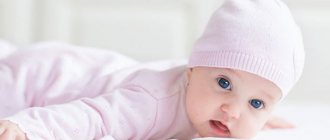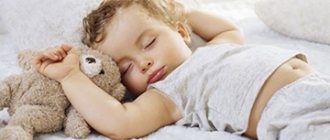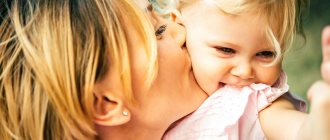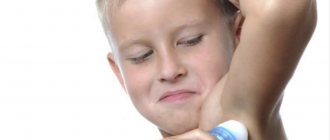Need to remember
When it's hot, provide comfortable conditions for your baby to sleep (crib, bedding, clothes). Prepare some water: if the baby starts shaking his head and wakes up, offer him a drink. Most parents play it safe and bundle up their baby. It should be remembered that the thermoregulation of children and adults differs; excessive zeal is not good for the child - he is unnecessarily tense due to the heat. In such situations, a vest and rompers made of thin fabric will suffice.
Soft bumpers are quite enough in winter, but in hot weather you should avoid them to improve air circulation.
When should you visit a doctor?
Very rarely, head shaking is a symptom of neurological disorders (autism, etc.). In such a situation, there are other features that signal to adults about some difference from the norm in development:
Visit a neurologist. Perhaps the baby needs timely treatment.
Sometimes tossing and turning in your sleep (before going to bed) indicates rickets. This disease implies a lack of vitamin D, a metabolic disorder, which affects not only the baby’s sleep, but also the development of the musculoskeletal system, and difficulties with nutrition arise.
Symptoms of the onset of rickets in a baby:
- hypertrophied sweating during sleep and eating;
- the child sleeps restlessly (see also: why does an infant sleep poorly at night?);
- his scalp is itchy and itchy;
- the back of the head goes bald;
- noticeably decreased muscle tone;
- later than peers learns to sit, stand with support, walk or crawl (we recommend reading: when a child begins to crawl: Komarovsky’s opinion).
Having started treating rickets, the doctor prescribes vitamin D (you can buy it in drops from a pharmacist) (more details in the article: how is rickets prevented in newborns?). Exercise therapy, massage, and physiotherapy using ultraviolet light may be indicated. Sometimes the parents of the baby are recommended to give him sunbathing: the sun provides vitamin D best of all. Self-medication in this situation is unacceptable - the dose of medication and the duration of treatment are determined only by the doctor!
Causes of neck pain
Neck pain in children can have several causes.
Common factors:
1. If your child is active or participates in sports , he or she may have experienced a muscle strain or sprain during one of the activities.
2. Pain can also be caused by an accident. For example, a car accident or a fall.
If your child has a neck injury due to a car accident or fall, seek immediate medical attention.
3. Often, poor position while sitting or sleeping , using a computer, carrying a heavy backpack are risk factors for increasing neck pain.
4. Swollen lymph nodes reacting to infection may also be a cause.
5. If the child's neck is tense on one side and hard to the touch, it may be torticollis.
Another telltale sign. To relieve tension, tilt your head toward the painful side and point your chin in the opposite direction to further relax your neck. Children with torticollis will also feel pain when turning their neck to the other side of the affected side, or when pressing on a tense area.
Torticollis is relatively common in newborns. Boys and girls are equally likely to develop pathological head tilt.
No one knows why some children develop torticollis and others do not. Most experts think that this is due to fetal spasms in the womb, or to its rare intrauterine position (for example, being in a breech position, where the baby’s buttocks are facing the birth canal). Using forceps or vacuum devices during delivery also makes the baby more susceptible to developing torticollis.
Back and neck pain is common in children, but the pain is usually mild and temporary. It can gradually move to other areas of the spine and become more intense, often leading to musculoskeletal problems in adulthood.
More rare causes
More serious but rare causes of neck pain or tension include:
- meningitis. If neck pain or excess tension (stiffness) occurs in combination with symptoms such as fever, irritability, headache, sensitivity to light, decreased appetite, nausea or vomiting, or rash, it is important to seek medical attention immediately. Meningococcal disease can progress quickly from initial symptoms to severe complications or death. Early diagnosis by a specialist is critical;
- tick bites. Another cause of pain is Lyme disease. This disease is often spread through tick bites. Always check the neck for signs of insect bites. You may see a reddened area or rash around the bite mark;
- cancer;
- rheumatoid arthritis.
Be sure to read a detailed description of the types of diseases such as juvenile rheumatoid arthritis in children and ways to alleviate the child’s condition.
Children may also have symptoms:
- nausea;
- weakness;
- headache;
- swollen lymph nodes;
- fever;
- pain in muscles and joints.
Let's draw conclusions
According to medical statistics, one out of five babies aged 2-3 months shakes their head when falling asleep or while sleeping. As a rule, this has a causal relationship with outbursts of emotions, overexcitation of the central nervous system, otitis media or pain from teething.
If this phenomenon is systemic (the head constantly shakes and the baby cries loudly after falling asleep), relaxation therapy may be necessary. It may be enough to reconsider adults’ approaches to bedtime rituals and daily routines.
As already mentioned, very rarely rocking is a symptom of a minor developmental delay or the onset of rickets. If this worries you, do not delay your visit to a neurologist and pediatrician.
Good afternoon. Please tell me how things developed for you. We are 6 and since we were 3, we constantly toss and turn and shake our heads at night.
She’s trying to do new movements like this, or she’s pumping, or she’s just interested in new movements))
You already know everything, but she is small, everything is unusual for her. Any movement, any sensation.
I had it that way. He likes it that way)))
Tell me, what exactly was the child sweating? We have wet legs and a head (in the crown area)
Didn't you tell the neurologist? Does he twist his head and sweat? - this could be signs of rickets.
No, he definitely doesn’t sweat! Yes, and I give vitamin D
Damn I thought you were me
I noticed that ours does this, if the gas is on and she can’t fart (she first raises her legs), then she starts spinning like that. Perhaps for you this is an indicator of some kind of discomfort.
This happened to us too, we increased vitamin D to 3 drops for a week and everything went away
Is this a pediatrician or a neurologist?
Both pediatrician and neurologist
Did you decide to increase it yourself or on the recommendation of a doctor?
On doctor's advice of course
My son's first teeth came out after this
And so it is with us. I’m an alarmist mother, I’ve been to 4 neurologists, by the way, at 4 months. Everyone told me the same thing, that this is the norm, it’s either a headache, or teeth, or it’s hot, the stomach, and a bunch of reasons why they turn their heads like that in their sleep) By the way, now this happens very very rarely. Unfortunately, I was looking for sores in my child, it’s like a phobia. Now I'm more relaxed about everything
Is this your first child? I’m the same) because I have no experience, so I worry about every thing! Have you found a good neurologist for your child? And tlims with searches
Every parent, of course, worries about the health of their child. The timely development of the child, his capabilities, as well as the future depend on the state of health. Any attentive parent always notices all the little things in their child’s behavior, even during sleep.
Sleep can be called an unconscious state, because a person does not control his movements, and that is why the baby’s behavior during sleep can tell the parent a lot. Many young mothers are worried that the child turns his head from side to side in his sleep, they begin to worry and wonder: is this normal? You began to notice that your child sleeps restlessly. He turns his head quite often in his sleep without waking up. What could this be and should I be worried?
A child turns his head in his sleep - we understand the reasons
- High physical activity. If your child is restless and cannot sit quietly in one place, constantly moves and minds “his” business, then the symptom most likely does not mean anything terrible. Children at an early age learn about the world around them in all available ways: they swing their arms and legs, crawl, try to pronounce sounds, and so on. The child was simply overexcited throughout the day.
- Emotional turmoil. Children are still tender creatures with a fragile psyche. A child can be very emotional and overreact to everything around him. He may be delighted by something beautiful, upset by something, or maybe scolded - children perceive all this very emotionally. Some impressive events may well cause a child to turn his head in his sleep.
- Accumulation of gases in the tummy. The problem of emitting gas has always bothered parents. Colic and other unpleasant symptoms do not allow you to live in peace. If there are difficulties with gas emission, the child may be capricious in his sleep, twitch and shake his head, and sometimes whine.
- Lack of vitamin D in the child's body. Proper and balanced nutrition of the child is very important so that developmental problems do not arise. A lack of vitamin D can cause some serious diseases.
- General discomfort during teething or unpleasant sensations. If the baby is teething, something hurts, he feels uncomfortable, then he will show it with all his appearance. Shaking your head in a dream can also be attributed to a child’s “protest.” Here it is necessary to observe the child for a longer time in order to gradually eliminate the causes of such behavior in a dream.
A child turns his head in his sleep - causes, normality or pathology and when to see a doctor
Every parent, of course, worries about the health of their child. The timely development of the child, his capabilities, as well as the future depend on the state of health. Any attentive parent always notices all the little things in their child’s behavior, even during sleep.
Sleep can be called an unconscious state, because a person does not control his movements, and that is why the baby’s behavior during sleep can tell the parent a lot.
Many young mothers are worried that the child turns his head from side to side in his sleep, they begin to worry and wonder: is this normal? You began to notice that your child sleeps restlessly.
He turns his head quite often in his sleep without waking up. What could this be and should I be worried?
A child turns his head in his sleep - we understand the reasons
- High physical activity. If your child is restless and cannot sit quietly in one place, constantly moves and minds “his” business, then the symptom most likely does not mean anything terrible. Children at an early age learn about the world around them in all available ways: they swing their arms and legs, crawl, try to pronounce sounds, and so on. The child was simply overexcited throughout the day.
- Emotional turmoil. Children are still tender creatures with a fragile psyche. A child can be very emotional and overreact to everything around him. He may be delighted by something beautiful, upset by something, or maybe scolded - children perceive all this very emotionally. Some impressive events may well cause a child to turn his head in his sleep.
- Accumulation of gases in the tummy. The problem of emitting gas has always bothered parents. Colic and other unpleasant symptoms do not allow you to live in peace. If there are difficulties with gas emission, the child may be capricious in his sleep, twitch and shake his head, and sometimes whine.
- Lack of vitamin D in the child's body. Proper and balanced nutrition of the child is very important so that developmental problems do not arise. A lack of vitamin D can cause some serious diseases.
- General discomfort during teething or unpleasant sensations. If the baby is teething, something hurts, he feels uncomfortable, then he will show it with all his appearance. Shaking your head in a dream can also be attributed to a child’s “protest.” Here it is necessary to observe the child for a longer time in order to gradually eliminate the causes of such behavior in a dream.
Head shaking during sleep as one of the symptoms of diseases
If a child has other pronounced symptoms in addition to shaking his head in a dream, then this is a reason to visit a doctor. An absolute determination of the cause of a child shaking his head in his sleep, and, as many years of practice have shown, this may indicate the presence of certain diseases. These include:
- Hydrocephalus of the brain (in children) is a disease that affects the tissues near the brain. It consists of excess cerebrospinal fluid in the head. Hydrocephalus most likely appears for the first time during 3-5 months of a child’s life. The causes may be: fetal hypoxia, birth injuries, congenital anomalies, infection with infectious diseases in the womb. Hydrocephalus can also be a consequence of the following diseases: mumps, syphilis, ARVI, herpes, toxoplasmosis and others. Symptoms of hydrocephalus: large skull size, swollen fontanel, cramps, poor sleep and appetite, vomiting, drowsiness and irritability, difficulty speaking and developing, inability to hold up head and sit up. For an accurate diagnosis, you need to contact a pediatrician; if you suspect this disease, visit a pediatric surgeon or neurologist. This disease has the potential for death and complications, so it is very important to detect it in time and begin immediate treatment.
- Early rickets is a disease caused by a lack of vitamin D in the child’s body. In this case, the exchange of phosphorus and calcium is disrupted, as a result of which bone tissue damage begins. This disease has specific signs: sleep disturbance, irritability and tearfulness, frequent shuddering, lack of appetite, swollen fontanel, baldness of the occipital area. In an advanced stage, rickets manifests itself in compactions on the ribs and wrists, curvature of the spine, chest, and the child may develop flat feet and develop an abnormal bite. Rickets is very important to diagnose and treat in a timely manner, since this disease can lead to disruption of the child’s development (both mental and physiological), improper development of the cardiovascular system, liver, lungs, and gastrointestinal tract. Typically, a pediatrician detects rickets during an examination of the baby, but sometimes a biochemical blood test may be necessary.
- Increased intracranial pressure (ICP). This can be ruled out by a pediatrician during a routine examination. With increased intracranial pressure, the child may have a headache, which is why the newborn child may shake his head in his sleep.
When to go to the doctor
Most often, the reason for head shaking in children in their sleep lies precisely in not particularly dangerous reasons. Therefore, if there are no signs of the above diseases, you most likely have nothing to worry about. The main thing is to treat the child carefully.
If head shaking in sleep does not stop after some time (after teething, for example), then it would be best to still visit your pediatrician, explain the reason for the visit and make sure that everything is fine with the child.
If any abnormalities are detected, only the attending local doctor will be able to prescribe the correct treatment. If you decide to try to figure it out on your own, this will not only not help your child, but may also worsen his health.
What should parents do when their baby shakes his head in his sleep?
First, you need to try to calm the child down. Take him in your arms, lull him to sleep, stroke him. Feeling that mom is nearby, the baby will soon calm down and fall asleep more soundly.
Head shaking in your sleep can be a common habit. Like, for example, someone biting their nails or clicking their tongue. By 3-4 years this goes away.
Your main task during this period is to make your baby’s sleep safe and eliminate the slightest possibility of any injuries. Carefully inspect the crib for protrusions, sharp corners and parts that could accidentally injure the child. It is advisable to cover the sides and edges with soft fabric.
Monitor the balance of vitamins, micro and macro elements of the baby. There are certain vitamin complexes for children and for young mothers. Sufficient levels of vitamin D in a child’s body will reduce the likelihood of rickets. Under no circumstances should you take vitamins without a doctor's prescription. An excess of vitamin D can lead to worse consequences than a lack of it.
Pay attention to your child's behavior. At an early age, you can determine what causes the most vivid and violent experiences in a child. Try to eliminate these factors for a while. This will help you understand the reason why your child shakes his head in his sleep.
So, a child’s restless behavior during sleep can have various reasons. The goal of parents is to preserve the health of their baby, which means everything depends only on you. Careful monitoring of the child's condition and development can prevent some diseases and abnormalities.
If you suspect any disease or developmental abnormality, you must immediately consult a doctor, carry out the necessary diagnostics and find out the reason for shaking your head in your sleep. Trying to understand the symptoms in the presence of a disease, as well as self-treatment of the child, can further harm the child’s health.
Only a pediatrician will be able to accurately determine the cause of this symptom, prescribe appropriate treatment if necessary, and help you and your baby.
If a disease, any developmental anomalies, deviations are detected at an early stage, it is always easiest to eliminate them, without allowing any complications or consequences.
Therefore, you should not put off visiting a doctor for a long time; it is always better to be safe.
The child starts in his sleep
How to wean your baby off night feedings
Miliaria in newborns
Source: https://feminissimo.ru/mama/deti-do-1-goda/rebenok-vo-sne-vertit-golovoy-prichini-i-kogda-stoit-obratitsya-k-vrachu.html
Head shaking during sleep as one of the symptoms of diseases
If a child has other pronounced symptoms in addition to shaking his head in a dream, then this is a reason to visit a doctor. An absolute determination of the cause of a child shaking his head in his sleep, and, as many years of practice have shown, this may indicate the presence of certain diseases. These include:
- Hydrocephalus of the brain (in children) is a disease that affects the tissues near the brain. It consists of excess cerebrospinal fluid in the head. Hydrocephalus most likely appears for the first time during 3-5 months of a child’s life. The causes may be: fetal hypoxia, birth injuries, congenital anomalies, infection with infectious diseases in the womb. Hydrocephalus can also be a consequence of the following diseases: mumps, syphilis, ARVI, herpes, toxoplasmosis and others. Symptoms of hydrocephalus: large skull size, swollen fontanel, cramps, poor sleep and appetite, vomiting, drowsiness and irritability, difficulty speaking and developing, inability to hold up head and sit up. For an accurate diagnosis, you need to contact a pediatrician; if you suspect this disease, visit a pediatric surgeon or neurologist. This disease has the potential for death and complications, so it is very important to detect it in time and begin immediate treatment.
- Early rickets is a disease caused by a lack of vitamin D in the child’s body. In this case, the exchange of phosphorus and calcium is disrupted, as a result of which bone tissue damage begins. This disease has specific signs: sleep disturbance, irritability and tearfulness, frequent shuddering, lack of appetite, swollen fontanel, baldness of the occipital area. In an advanced stage, rickets manifests itself in compactions on the ribs and wrists, curvature of the spine, chest, and the child may develop flat feet and develop an abnormal bite. Rickets is very important to diagnose and treat in a timely manner, since this disease can lead to disruption of the child’s development (both mental and physiological), improper development of the cardiovascular system, liver, lungs, and gastrointestinal tract. Typically, a pediatrician detects rickets during an examination of the baby, but sometimes a biochemical blood test may be necessary.
- Increased intracranial pressure (ICP). This can be ruled out by a pediatrician during a routine examination. With increased intracranial pressure, the child may have a headache, which is why the newborn child may shake his head in his sleep.
When to go to the doctor
Most often, the reason for head shaking in children in their sleep lies precisely in not particularly dangerous reasons. Therefore, if there are no signs of the above diseases, you most likely have nothing to worry about. The main thing is to treat the child carefully. If head shaking in sleep does not stop after some time (after teething, for example), then it would be best to still visit your pediatrician, explain the reason for the visit and make sure that everything is fine with the child.
If any abnormalities are detected, only the attending local doctor will be able to prescribe the correct treatment. If you decide to try to figure it out on your own, this will not only not help your child, but may also worsen his health.
What should parents do when their baby shakes his head in his sleep?
First, you need to try to calm the child down. Take him in your arms, lull him to sleep, stroke him. Feeling that mom is nearby, the baby will soon calm down and fall asleep more soundly.
Head shaking in your sleep can be a common habit. Like, for example, someone biting their nails or clicking their tongue. By 3-4 years this goes away.
Your main task during this period is to make your baby’s sleep safe and eliminate the slightest possibility of any injuries. Carefully inspect the crib for protrusions, sharp corners and parts that could accidentally injure the child. It is advisable to cover the sides and edges with soft fabric.
Monitor the balance of vitamins, micro and macro elements of the baby. There are certain vitamin complexes for children and for young mothers. Sufficient levels of vitamin D in a child’s body will reduce the likelihood of rickets. Under no circumstances should you take vitamins without a doctor's prescription. An excess of vitamin D can lead to worse consequences than a lack of it.
Pay attention to your child's behavior. At an early age, you can determine what causes the most vivid and violent experiences in a child. Try to eliminate these factors for a while. This will help you understand the reason why your child shakes his head in his sleep.
So, a child’s restless behavior during sleep can have various reasons. The goal of parents is to preserve the health of their baby, which means everything depends only on you. Careful monitoring of the child's condition and development can prevent some diseases and abnormalities.
If you suspect any disease or developmental abnormality, you must immediately consult a doctor, carry out the necessary diagnostics and find out the reason for shaking your head in your sleep. Trying to understand the symptoms in the presence of a disease, as well as self-treatment of the child, can further harm the child’s health.
Only a pediatrician will be able to accurately determine the cause of this symptom, prescribe appropriate treatment if necessary, and help you and your baby. If a disease, any developmental anomalies, deviations are detected at an early stage, it is always easiest to eliminate them, without allowing any complications or consequences. Therefore, you should not put off visiting a doctor for a long time; it is always better to be safe.
Parents love to look at the baby when he sleeps, noticing all the nuances of his behavior. Seeing that the baby turns his head from side to side in his sleep, especially if this is repeated regularly, mothers begin to worry, assuming that the baby’s health is not all right. Is it really?

Causes of neck tics
Hyperkinesis in children can be:
- primary (idiopathic);
- secondary.
Primary nervous tics are caused by external (exogenous) factors. The onset of tic disorder most often occurs between the ages of 5 and 12 years. At this stage of growing up, a person’s mental development occurs at an intensive pace and motor activity improves. During this period, an immature personality is most vulnerable to negative psycho-emotional influences.
The following circumstances can provoke a nervous tic of the neck in a child:
- acute psycho-emotional trauma that caused severe fear;
- a serious disagreement with parents, as a result of which the child feels unnecessary and defective;
- unfavorable atmosphere in the family, conflict situation;
- change in family composition;
- deficit of parental attention;
- excessive criticality, excessive demands;
- strict methods of education, undeserved punishment, use of physical force;
- chronic fatigue due to high mental stress;
- prolonged use of a computer and other gadgets;
- sudden change in habitat - moving to another place of residence;
- joining a new children's team.
Secondary nervous tics are caused by chronic diseases of the central nervous system. The manifestation of the disease is most often observed before 5 years of age.
The causes of secondary tic disorder are:
- congenital pathologies of the central nervous system;
- birth trauma of the skull;
- traumatic effects on areas of the head;
- benign and malignant brain tumors;
- neuroinfections;
- intoxication of the body with opiates;
- uncontrolled use of psychostimulants;
- genetically determined pathologies (Huntington's disease).
About hypnotherapy. What is regression hypnosis and hypnotherapy? Review of treatment for fear of the dark
Hypnosis: a review of the treatment of fear of riding the subway & psoriasis & social phobia
Hypnosis: review of hypnosis treatment of tachophobia (fear of speed).
Hypnosis: a review of the treatment of social phobia and acrophobia (fear of heights).
Why does a baby shake his head in his sleep?
Young children most often use head movements: nodding, rotating, rhythmic movements to calm themselves before bed. Then they are completely harmless to their health. This behavioral feature of babies affects the age group between 2 months and three to four years. Four-year-old children are already getting rid of this symptom.
Important! There are situations when the fact that a baby shakes its head in a dream is an indirect sign of various diseases or one of the direct symptoms of pathology.
Breasts may shake their heads in their sleep for the following reasons:
- An attempt at relaxation. It is not known exactly why these movements occur, which do not pose any health risks, but it is believed that children perform them to relax and fall asleep. It can also be a learned behavior in which the baby copies the parent's rocking behavior;
- An outburst of emotions. A baby's life is filled with strong emotions associated with learning about the world. During sleep, the brain processes the information received during the day, and the baby can make rhythmic head movements;
- If a child shakes his head in his sleep, in this way he may react to pain in the ears during illness or in the gums during teething;

The child's ears hurt
- Children may have a bad dream and not only roll around in the crib, but also cry;
- The baby does not sleep well at night, may groan and turn his head if he experiences discomfort because he is hot or his diaper is wet;
- When a baby has stomach colic, he raises his legs to his stomach and is able to shake his head from pain;

Colic in a newborn
- A lack of vitamin D and the beginning to develop rickets are manifested in the fact that the infant has unpleasant sensations in the neck area, and the baby begins to jerk and twist his head in an attempt to get rid of them.
Much less often, head shaking is a symptom of serious diseases and disorders:
- Hydrocephalus, or the accumulation of fluid inside the deep cavities (ventricles) of the brain. When there is excess fluid, the size of the ventricles increases and pressure is put on the brain. Symptoms of the disease in infants are a rapid increase in head size, swollen fontanel, poor response to touch, convulsions;
- Epilepsy. A neurological disease, one of the symptoms of which is sudden and rapid turning of the head in different directions;
- Repetitive head movements are sometimes a sign of autism;
- Intracranial hypertension (increased pressure);
- Krabbe disease. A hereditary disease in which the protective membrane of neurons in the brain and the entire nervous system is disrupted. Its first signs are observed in children under 6 months of age and are expressed in loss of control over head movements, muscle spasms, frequent vomiting, irritability, and sudden sharp screams.
The child shakes his head: normal or abnormal?
Mom, like no one else, knows how to feel the baby and immediately notices the slightest changes in his behavior.
The little person's new skills - the first laugh, the first word, the first step - are a source of pride for parents. However, they also have plenty of reasons to worry. For example, if a child shakes his head, an inexperienced mother will immediately decide that something is wrong with him.
But in most cases, this child’s behavior is quite understandable and is not a deviation.
Causes of head shaking
If you contact a professional neurologist and complain that the child is shaking his head from side to side, he will most likely tell you about the phenomenon of yactation.
This phenomenon was discovered by specialists who observed young orphans.
Children in orphanages, deprived of their mother's love, affection and attention, swayed or shook their heads, trying to calm down. Essentially, this is self-sickness, with the help of which a child fights psychological discomfort.
Important! It is a mistake to think that children who grow up in ordinary families cannot suffer from a lack of attention or tactile contact.
In addition, the atmosphere in the family can influence the child’s condition. Frequent quarrels and scandals cause emotional stress in the child.
He still cannot talk about his feelings, and instinctively tries to calm down in an accessible way - he shakes his head. In this case, it is a kind of release. This is how the baby expresses his emotions.
Read the important article: Parents’ quarrels and their impact on the child>>>
Scientists have found that there is a category of children who, from birth, have an increased need for sensory stimulation. This is their feature:
- they spend a lot of time in their arms;
- love motion sickness;
- fall asleep to “white noise” or pleasant melodies.
At the age of 5–8 months, such children may experience measured swaying of the whole body or shaking of the head during wakefulness or sleep.
For information on the gentle care, upbringing and development of a child up to one year old, see the online course My beloved baby>>>
What other reasons could there be why a child shakes his head:
- The reason may be due to increased intracranial pressure in the baby.
If during childbirth he experienced oxygen starvation, then subsequently, due to changes in atmospheric pressure and overwork, the baby may have a headache.
To cope with painful sensations, he will shake his head.
- Children may suffer from ear problems.
Note ! If your baby shakes his head before latching on to the breast or bottle, or starts sucking and then stops, he probably has a real ear ache.
Apply gentle pressure to the tragus. If the child cries and withdraws, a consultation with an ENT doctor is required!
- Teething may also be the reason for this behavior. The baby feels discomfort and tries to eliminate it, to distract himself. Read more about teething in children>>>
- If a child shakes his head in his sleep, he may be dreaming about something bad or experiencing discomfort associated with a stuffy room, thirst, or a wet diaper.
How to improve your baby’s sleep, see the online course Calm baby’s sleep from 0 to 6 months>>>
Important! If the reasons why your son or daughter turns their head are related to pain in the gums and ears, then the children will be restless, whiny, and their sleep and appetite will be disturbed.
Age-related characteristics of head shaking
Pediatricians believe that head shaking is an age-related phenomenon. It occurs around 2 months of age and goes away on its own by 3 years of age. The phenomenon of yactation does not affect the development of children in any way, so parents should have no reason to worry.
There are some age-related features of this phenomenon.
So, if a 5-month-old baby shakes his head, he is most likely simply learning a new motor skill in this way. Or maybe he's just tired and wants to sleep? Take a closer look when the baby begins to perform these movements, and very soon you will understand the true reason for this behavior.
Is your 6 month old baby shaking his head? At this age, many children begin to cut their first teeth.
Or the baby may shake his head because he is having fun. It has been noticed that boys 6-7 months old find this activity funny. They turn their heads and bang them against the sides of the crib. It's just that kind of game.
A 7 month old baby often shakes his head due to boredom or because he is trying to attract attention. Their waking hours increase, they actively explore the world and demand attention.
At 8 months the baby is already able to show character. He gets acquainted with complementary foods, his taste habits are formed. Therefore, head shaking at this age is often a child’s protest, defending his own boundaries.
A child who shakes his head at 8 months can thus give his mother a signal: “I’m tired, I’ve had an active day, I’ve had enough impressions for today.”
By the age of one year, training of the vestibular apparatus begins, which is involved in the coordination of movements. With its help, the baby does not fall on his side and can move in the chosen direction.
If the vestibular apparatus is well developed, it will not get motion sickness in transport and riding on a carousel will bring only positive emotions.
If a child shakes his head from side to side every year, then this is how he trains the vestibular apparatus. As an alternative, you can offer him exercises on a fitball, during which you can rock your son or daughter from side to side.
Read about what a 1-year-old child should be able to do>>>
Take the kids on the swings. Let them hang upside down from sofas or from your arms - this is very useful. Of course, you need to take care of security measures.
How should parents respond to head shaking?
If you encounter a similar problem, do not rush to panic. Ideally, try not to focus on it. Understand that over time the baby will outgrow this.
Important! Helping your child cope with anxiety, paying attention to him, calming him down - you can do it.
What should be done?
- If your baby shakes his head before falling asleep, create an evening ritual.
Let him take a bath with soothing herbs - it's great for relaxing. Read more in the article Herbs for bathing a newborn>>>
A lullaby or bedtime story from mom will also calm the baby.
- Let massage become a habit. Gentle stroking will help your baby fall asleep faster. They will calm him down even in his sleep, if he dreams of something terrible.
- While awake, try to switch your baby’s attention and keep him busy with an interesting game.
- Find a competent osteopath.
Such specialists can work wonders, help remove muscle tension or solve a problem in which doctors shrug their shoulders and recommend just waiting until it outgrows.
When should you seek advice?
In some cases, parents' concerns may be justified. You should be alert and see a doctor if your child has other symptoms in addition to head shaking:
- The child actively sweats during feeding and sleep, lags behind his peers in development, sleeps and eats poorly, and the back of his head becomes bald. These may be the first signs of rickets. Read more in the article Signs of rickets in infants>>>
- The child begins to shake his head more strongly if he is worried, does not respond to sounds, does not focus his eyes, scratches or bites himself. These are signs of autism spectrum disorder.
In all other cases, you should not worry if the child shakes his head from side to side for a year, or he is only a few months old. Just put everything aside and pay attention to him. Babies grow very quickly. Enjoy your time together.
Happy motherhood!
Source: https://uroki4mam.ru/rebenok-motaet-golovoj
Features of head shaking associated with age
For reasons that do not cause concern, the baby turns its head in its sleep, starting at about 2 months. In the fourth year of life this gradually stops.
Important! At certain age stages, head shaking can occur due to various factors. Some of them disappear, others appear.
For example, a newborn is about to start teething, and she begins to shake her head in her sleep because of pain in her gums. After the teeth come out, the factor that provokes these movements will disappear. Children aged 6-8 months are actively exploring the world and are overwhelmed with emotions, therefore, when falling asleep, they can shake their heads amid excitement from the day's impressions.
When a baby turns his head in his sleep, 3 months is the age when the first attempts to calm down and relax may appear. It is also possible that these are early signs of vitamin D deficiency.
Four-month-old babies begin to cut their teeth. If the child has never shook his head in his sleep before and suddenly begins to do this, while he salivates profusely, the baby whines and sleeps poorly, then it is quite possible that the change in behavior is associated with teething.
Why does a small child shake and turn his head from side to side?
Experts note this phenomenon in children aged 2 months to 3 years. There are several reasons why young children shake their heads. Among them there are quite harmless ones that are easy to eliminate.
In other cases, the phenomenon indicates the presence of disorders of the nervous system. Diseases are accompanied by additional symptoms, so the doctor analyzes the child’s behavior and overall well-being.
Head shaking can occur when the baby is teething, colic and headaches bother him. Symptoms of teething (6-8 months) and intestinal colic (mostly before 3 months of life) disappear with age. The sources of headaches can be different; in this case, examination and consultation with a pediatrician is necessary.
Common “harmless” reasons
Little children love to indulge and play. This is precisely the goal they pursue, shaking their heads from side to side. Many people laugh fervently at this.
In some cases, the child wants to attract the attention of the parents. Mom and dad should evaluate their behavior and analyze whether they are communicating enough with the child. Don't think that the baby is just being capricious. Lack of attention and affection negatively affects the health and development of the child.
Sometimes head shaking is due to the fact that the baby cannot calm down. Rhythmic rocking relaxes and helps you fall asleep. There is no need to leave the child alone in the crib; you need to take him in your arms or in a sling, rock him and sing a lullaby. A warm bath and reading fairy tales can also soothe your baby before bedtime. Gradually the habit of shaking your head will pass.
Neurological diseases
If the above steps do not give the desired result, you should consult a pediatrician or neurologist. Particular attention should be paid to shaking your head immediately before going to bed. It may indicate the following diseases:
- Epilepsy. The child freezes for a few seconds and stops responding to external stimuli. More severe forms are characterized by seizures and loss of consciousness.
- Autism. Autistic children are terrified of being left alone and require the constant presence of their mother nearby. This disease is quite common, but children are not always given an accurate diagnosis. With proper upbringing, children grow up to be full-fledged individuals, achieve success in various fields, but at the same time have their own mental characteristics.
- Krabbe disease. This is a hereditary disease, one of the symptoms of which is head shaking. Sick children experience increased body temperature, increased excitability, and developmental delays compared to their peers. The prognosis for them is unfavorable, it is almost impossible to cure the disease, you can only reduce the severity of the symptoms.
- Opticomyelitis. An autoimmune disease that affects the spinal cord and optic nerve. Characteristic symptoms are dizziness, fever, blurred vision and even blindness. In most cases it leads to death.
Experts are confident that signs that appear at 1, 3, 9 months and 1 year are considered indicative. It is at this time that neurological disorders most often manifest themselves.
The baby has rickets
Most often, signs of rickets are observed in children aged 3 months. The normal formation of the skeletal system is disrupted, as a result of which the limbs become bent. Mom and dad should be alerted to the fact that the child does not hold his head up as expected. If parents regularly visit their local pediatrician, this symptom will definitely be identified.
A child with rickets feels constant discomfort in the neck area, and therefore begins to intensively turn his head. Other symptoms of rickets:
- tearfulness;
- restless sleep;
- increased sweating;
- low weight.
Experts believe that the main cause of the disease is a lack of vitamin D and insufficient exposure of the baby to the sun. Early detection of rickets will prevent possible complications. Pediatrician E.O. Komarovsky is confident that breastfeeding completely prevents the occurrence of this disease.
Ways to help a baby
If a baby turns his head only when falling asleep, and then sleeps peacefully all night until the morning, waking up exclusively for natural reasons (wet diaper, feeling hungry), most likely he is trying to calm down and relax. It is better for mothers to pay attention to this and help the baby.
Pediatricians believe that if a baby has problems falling asleep: head shaking, whining, restless sleep, but the baby is absolutely healthy, parents need to analyze the lifestyle of not only the child, but the entire family.
It is worth considering whether the daily routine is followed, or whether everything is done randomly and arbitrarily, how meal times, walks, games are planned, and whether the mother has at least a few minutes for her own rest and recovery.
Important! The introduction of a predictable daily routine gives the child a greater sense of security and is suitable for children with disturbances in the regulation of the circadian rhythm (cyclical fluctuations in the intensity of biological processes in the body).
Some good ways to help your baby calm down:
- Taking a relaxing bath before bed. Baths with herbal infusions, such as chamomile, have a good effect;

Relaxing bath for baby
- Massage treatments also have a calming effect. Movements should be caressing and stroking. In this case, you can talk to the baby in a quiet voice with calm intonations. Mom's voice and gentle touches will reduce the baby's excitement and set him up for a healthy sleep.
- It is also recommended to stroke the baby during sleep if he behaves restlessly. You can rhythmically and gently pat the back or side; such actions lull the baby to sleep;
- Any factors that disturb the child’s sleep should be avoided. Perhaps, upon waking up, he again begins to move his head, rotating it to the sides, in order to relax and fall asleep again. Such factors will be high temperature in the room and, as a result, overheating of the baby, loud sounds, irritating light.
Important! It is unlikely that a child will harm himself by shaking his head while sleeping in a crib, but it is necessary to take safety measures: remove all unnecessary objects, carefully check the condition of the sides of the crib to see if there are any protruding fasteners.
The child began to twist and turn his head strongly in his sleep: reasons at 3 and 4 months
Parents love to look at the baby when he sleeps, noticing all the nuances of his behavior. Seeing that the baby turns his head from side to side in his sleep, especially if this is repeated regularly, mothers begin to worry, assuming that the baby’s health is not all right. Is it really?
Sleeping baby
Why does a baby shake his head in his sleep?
Young children most often use head movements: nodding, rotating, rhythmic movements to calm themselves before bed. Then they are completely harmless to their health. This behavioral feature of babies affects the age group between 2 months and three to four years. Four-year-old children are already getting rid of this symptom.
Important! There are situations when the fact that a baby shakes its head in a dream is an indirect sign of various diseases or one of the direct symptoms of pathology.
Breasts may shake their heads in their sleep for the following reasons:
- An attempt at relaxation. It is not known exactly why these movements occur, which do not pose any health risks, but it is believed that children perform them to relax and fall asleep. It can also be a learned behavior in which the baby copies the parent's rocking behavior;
- An outburst of emotions. A baby's life is filled with strong emotions associated with learning about the world. During sleep, the brain processes the information received during the day, and the baby can make rhythmic head movements;
- If a child shakes his head in his sleep, in this way he may react to pain in the ears during illness or in the gums during teething;
The child's ears hurt
- Children may have a bad dream and not only roll around in the crib, but also cry;
- The baby does not sleep well at night, may groan and turn his head if he experiences discomfort because he is hot or his diaper is wet;
- When a baby has stomach colic, he raises his legs to his stomach and is able to shake his head from pain;
Colic in a newborn
- A lack of vitamin D and the beginning to develop rickets are manifested in the fact that the infant has unpleasant sensations in the neck area, and the baby begins to jerk and twist his head in an attempt to get rid of them.
Much less often, head shaking is a symptom of serious diseases and disorders:
- Hydrocephalus, or the accumulation of fluid inside the deep cavities (ventricles) of the brain. When there is excess fluid, the size of the ventricles increases and pressure is put on the brain. Symptoms of the disease in infants are a rapid increase in head size, swollen fontanel, poor response to touch, convulsions;
- Epilepsy. A neurological disease, one of the symptoms of which is sudden and rapid turning of the head in different directions;
- Repetitive head movements are sometimes a sign of autism;
- Intracranial hypertension (increased pressure);
- Krabbe disease. A hereditary disease in which the protective membrane of neurons in the brain and the entire nervous system is disrupted. Its first signs are observed in children under 6 months of age and are expressed in loss of control over head movements, muscle spasms, frequent vomiting, irritability, and sudden sharp screams.
Features of head shaking associated with age
Why does a baby spit up curd - what to do?
For reasons that do not cause concern, the baby turns its head in its sleep, starting at about 2 months. In the fourth year of life this gradually stops.
Important! At certain age stages, head shaking can occur due to various factors. Some of them disappear, others appear.
For example, a newborn is about to start teething, and she begins to shake her head in her sleep because of pain in her gums. After the teeth come out, the factor that provokes these movements will disappear. Children aged 6-8 months are actively exploring the world and are overwhelmed with emotions, therefore, when falling asleep, they can shake their heads amid excitement from the day's impressions.
At 3 months
When a baby turns his head in his sleep, 3 months is the age when the first attempts to calm down and relax may appear. It is also possible that these are early signs of vitamin D deficiency.
At 4 months
Four-month-old babies begin to cut their teeth. If the child has never shook his head in his sleep before and suddenly begins to do this, while he salivates profusely, the baby whines and sleeps poorly, then it is quite possible that the change in behavior is associated with teething.
Ways to help a baby
If a baby turns his head only when falling asleep, and then sleeps peacefully all night until the morning, waking up exclusively for natural reasons (wet diaper, feeling hungry), most likely he is trying to calm down and relax. It is better for mothers to pay attention to this and help the baby.
Why a baby cannot fart - what to do
Pediatricians believe that if a baby has problems falling asleep: head shaking, whining, restless sleep, but the baby is absolutely healthy, parents need to analyze the lifestyle of not only the child, but the entire family.
It is worth considering whether the daily routine is followed, or whether everything is done randomly and arbitrarily, how meal times, walks, games are planned, and whether the mother has at least a few minutes for her own rest and recovery.
Important! The introduction of a predictable daily routine gives the child a greater sense of security and is suitable for children with disturbances in the regulation of the circadian rhythm (cyclical fluctuations in the intensity of biological processes in the body).
Some good ways to help your baby calm down:
- Taking a relaxing bath before bed. Baths with herbal infusions, such as chamomile, have a good effect;
Relaxing bath for baby
- Massage treatments also have a calming effect. Movements should be caressing and stroking. In this case, you can talk to the baby in a quiet voice with calm intonations. Mom's voice and gentle touches will reduce the baby's excitement and set him up for a healthy sleep.
- It is also recommended to stroke the baby during sleep if he behaves restlessly. You can rhythmically and gently pat the back or side; such actions lull the baby to sleep;
- Any factors that disturb the child’s sleep should be avoided. Perhaps, upon waking up, he again begins to move his head, rotating it to the sides, in order to relax and fall asleep again. Such factors will be high temperature in the room and, as a result, overheating of the baby, loud sounds, irritating light.
Important! It is unlikely that a child will harm himself by shaking his head while sleeping in a crib, but it is necessary to take safety measures: remove all unnecessary objects, carefully check the condition of the sides of the crib to see if there are any protruding fasteners.
Alarming symptoms
If head movements during sleep are very strong, such that there is a risk of injury to the baby, or they do not disappear after five years, it is advisable to consult a pediatrician.
In addition to head shaking, symptoms indicating a lack of vitamin D and the possible development of rickets include:
- excessive sweating on the back of the head while the baby is feeding or sleeping;
- delayed teething;
- flattening of the skull bones in the occipital area;
- fontanelles do not heal for a long time;
- the hair on the back of the head disappears;

Bald back of the head with rickets
- irritability and restlessness during sleep;
- loss of appetite;
- muscle weakness.
Important! Only a doctor can make a diagnosis and prescribe vitamin D in the correct doses.
Early manifestations of autism can be recognized by the following signs:
- the baby does not smile when he sees his parents or relatives;
- the child expresses little emotion;
- the baby does not seek eye contact;
- The baby may not like being hugged.
Neurological diseases or the development of rickets are never determined solely by the presence of head shaking in sleep. They have accompanying signs that can be analyzed by a specialist. If the baby simply turns his head without other symptoms, most likely, concern about his health is in vain, but it is necessary to calm the child or eliminate the influence of irritating factors.










